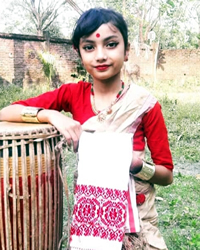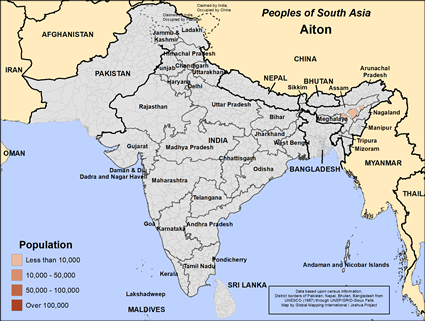Aiton (Tai Aiton) in India

Photo Source:
Baby Devi 26 - Wikimedia
Creative Commons
|

Map Source:
People Group data: Omid. Map geography: UNESCO / GMI. Map Design: Joshua Project
|
| People Name: | Aiton (Tai Aiton) |
| Country: | India |
| 10/40 Window: | Yes |
| Population: | 3,300 |
| World Population: | 3,300 |
| Primary Language: | Aiton |
| Primary Religion: | Buddhism |
| Christian Adherents: | 0.00 % |
| Evangelicals: | 0.00 % |
| Scripture: | Translation Started |
| Ministry Resources: | No |
| Jesus Film: | No |
| Audio Recordings: | Yes |
| People Cluster: | South Asia Buddhist |
| Affinity Bloc: | South Asian Peoples |
| Progress Level: |
|
Introduction / History
The ancestors of the Aiton originated in northern Myanmar, where they lived for centuries along with other Tai-speaking groups. 'In the latter part of the eighteenth century, the Aiton entered Assam as political refugees from the Shan State in Burma…. They speak the Aiton language among themselves and Assamese, Hindi and English with others.
The Aiton ethnic group inhabits villages in the Jorhat and Karbi-Aleng districts of Assam State in north-east India. The Indian government does not recognize the Aiton at all, so reliable information about them is scarce. The linguist Anthony Diller in 1990 estimated that there were 'several thousand speakers and semi-speakers' of Aiton.
What Are Their Lives Like?
The Aiton language is part of the Northwest branch of the Southwestern Tai family. It is one of nine different languages that share this affiliation, including Ahom, Khamti, Tai Phake and Khamiyang, all of which are spoken by other ethnic groups in this part of India. Aiton is believed to be similar to the Shan language spoken in Myanmar, China and Thailand, but after more than two centuries of separation from their homeland, the Aiton language, culture and identity have gradually been assimilated.
Elders among the Aiton are responsible for handing the oral traditions, folk tales and songs about their origin and migration down to the next generation. Their songs tell of oppression in their original homeland, which led to their long and difficult journey across the mountains into India.
Until the past decade all Aiton were farmers, fishermen and hunters, but in recent years an increasing number of people have become businessmen, teachers and labourers in the nearby townships in both the government and private sectors.
Despite their small population, there are 14 different clans among the Aiton. These days the people use their respective clan names as their surnames. The strict marriage customs of the Aiton mean that a young man must marry his maternal uncle's daughter. A bride price is required, whereby the family of the groom must pay an agreed-upon amount of cash and goods to the family of the bride. In part this is an expression of gratitude to the bride's family for their years of expense in raising her. Buddhist monks are called upon to officiate at the wedding ceremony, which is held at the bride's house. After giving birth an Aiton woman must not interact with other members of the community for a full month, as she is considered polluted. After the month has passed a ritual is performed and the new mother is free to return to society.
What Are Their Beliefs?
All Aiton are followers of Theravada Buddhism, which they brought with them when they migrated into India more than 200 years ago. They also worship Medham Medhphi, their deity, every morning and evening. The vyas-chow chanq, the diviner, is called for treatment of the indisposed. God has not forgotten them and desires that they may know him as Lord and Savior.
What Are Their Needs?
These people need to put their hope and identity in the King of kings and Lord of lords.
Prayer Points
Pray for workers to go to the Aiton people, and for their hearts to be ready to receive their Savior.
Pray for families of believers loving and serving others to grow reproducing churches.
Pray for a chain reaction of families reaching families that results in thousands of new believers who share their faith with others.
Pray for grace and truth expanding into their entire society as all believers learn to love others.